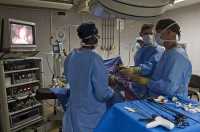Endoscopy, a crucial diagnostic and therapeutic tool in modern medicine, is constantly evolving. Advancements in technology are set to revolutionise how endoscopic procedures are performed, enhancing their accuracy, safety, and efficacy.
Here, we explore the emerging trends and innovations shaping the future of endoscopy.
Artificial Intelligence and Machine Learning
One of the most promising developments in endoscopy is the integration of artificial intelligence (AI) and machine learning. These technologies enhance diagnostic capabilities by providing real-time image analysis, which helps in the identification of abnormalities, polyps, and early signs of cancer with unprecedented accuracy.
Machine learning algorithms can also predict patient outcomes and suggest personalised treatment plans based on vast amounts of historical data, improving overall patient care.
Miniaturisation and Micro-Robotics
The trend towards miniaturisation is leading to the development of swallowable capsules equipped with tiny cameras. These capsules can capture high-quality images of the gastrointestinal tract as they travel through it, offering a less invasive alternative to traditional endoscopy.
Additionally, micro-robotic devices are being developed to navigate and perform procedures within the body with high precision, reducing the need for larger incisions and enhancing recovery times.
(more…)


